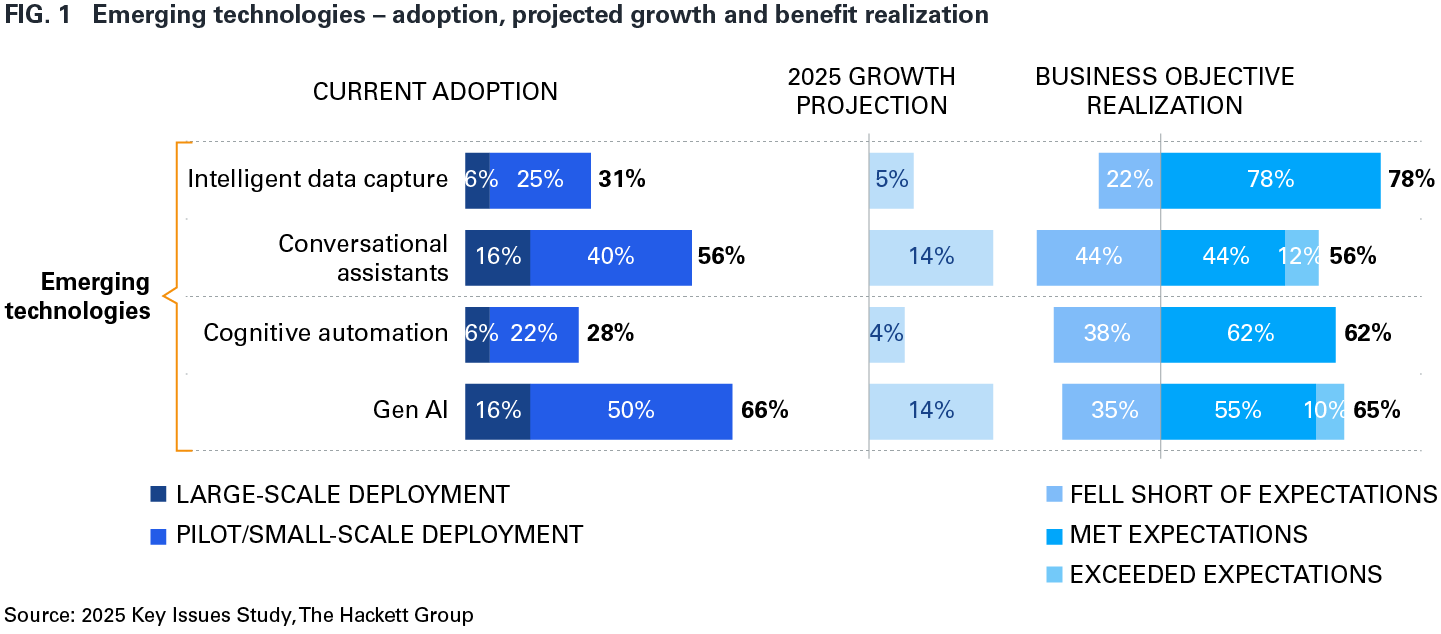The HR Imperative: Scaling Gen AI and Reimagining Work
In just one year, the conversation around generative artificial intelligence (Gen AI) has transformed from curiosity to necessity. Companies are no longer merely exploring Gen AI – they are accelerating its deployment to enhance performance and maintain a competitive edge. According to The Hackett Group’s 2025 Key Issues Study, an astonishing 89% of executives across business functions report advancing Gen AI initiatives, a dramatic shift from the previous year when only 16% viewed Gen AI–driven business transformation as a high priority.
For HR leaders, the imperative to seamlessly integrate Gen AI into their operations while simultaneously fostering its deployment across the enterprise has never been more critical. While HR functions are often at the forefront of enterprise-wide mandates, four of the top five HR priorities for 2025 involve enterprise human capital objectives, including workforce productivity, employee experience and AI’s impact on the workforce. The message is clear: embracing Gen AI is no longer just about improving HR processes – it’s about ensuring overall enterprise success and reimagining work in its current form.
The rise of Gen AI assistants and agents
One of the great underrecognized challenges facing organizations prioritizing and moving ahead with Gen AI is the need to reimagine their work and their workforce to determine the role AI assistants and agents will play and decide where AI can assist human performance, where it can augment human performance, and where it can work autonomously.
Defining Al
Assistants: Intelligent applications that understand natural language and use conversational interfaces to complete tasks on behalf of users.
Agents: Intelligent applications that perform tasks autonomously on behalf of users or other systems without the need for constant human intervention.
Together these tools are poised to revolutionize operations by enhancing efficiency, reducing manual errors and providing real-time insights that enable more agile decision-making.
Gen AI is a transformative force that has only just begun to reshape work and the workforce. Organizations that fail to integrate Gen AI assistants and agents into their workflows will fall behind in an increasingly AI-driven economy. HR is uniquely positioned and well equipped to play a primary role not only in addressing this particular foundational challenge, but also in AI adoption in general.
HR’s expanding role in Gen AI adoption
The HR function has historically played a key role in workforce transformation, and Gen AI presents a new opportunity to revolutionize service delivery and productivity. Encouragingly, 66% of HR organizations have already adopted or begun to adopt Gen AI technologies – outpacing the adoption of other emerging digital tools in years past. This progress, however, has primarily been in pilots or small-scale deployments.
Despite facing a steep learning curve, HR leaders are already recognizing measurable benefits from Gen AI, with a majority reporting that Gen AI solutions have so far met or exceeded their expectations. This realization is fueling a significant projected expansion of Gen AI use across HR functions in 2025 (Fig. 1).

From experimentation to large-scale deployment
HR’s use of Gen AI is evolving rapidly. Currently, the most common applications for AI within HR include:
- Creating job descriptions (52%)
- Drafting employee communications (48%)
- Generating interview questions (35%)
However, organizations are looking beyond these early applications toward more complex and large-scale implementations (Fig. 2).
Key desired growth areas in 2025 include:
- Screening resumes (39%): Automating talent acquisition processes to improve efficiency
- Identifying and documenting skills (29%): Enhancing workforce planning with AI-driven insights
- Developing onboarding materials and training content (29%): Personalizing learning and development programs
- Answering common employee questions (45%): Expanding direct access to information to employees.
Additionally, HR service delivery is poised for major transformation. Many are exploring AI-driven solutions to handle employee and manager inquiries, develop knowledge articles and enhance direct access to HR services.

By offloading routine tasks to Gen AI, HR teams will free up much needed capacity, allowing them to focus on high-value strategic activities, such as workforce planning, talent retention and employee engagement. This points to a broader imperative that spans the entire enterprise: as organizations scale Gen AI, they will need to determine where Gen AI can assist and augment employee performance, and where it can work autonomously.
That is why it is not enough to simply identify and deploy Gen AI initiatives – optimization of Gen AI is dependent on the willingness to rethink current work functions and processes. Organizations must act boldly to reimagine work and the workforce. And as they grapple with deploying AI and reimagining work and the workforce, they will also need to manage a number of other top priorities, primarily involving process and technology complexity, data quality, change management and the challenge of setting reasonable expectations.
The HR mandate: Strategic priorities for 2025
The evolving role of HR extends beyond efficiency gains – HR leaders are increasingly being called upon to drive enterprise-wide transformation. The Hackett Group’s study identified five top priorities for HR in 2025 – priorities largely shaped by ongoing business uncertainty, workforce pressures, evolving employer-employee dynamics and the accelerating capabilities of Gen AI–powered tools available to HR.
These are the top five HR priorities for 2025:
1. Workforce planning and talent intelligence
With talent shortages persisting across industries, HR leaders are prioritizing strategic workforce planning powered by AI-driven insights. Gen AI–augmented talent intelligence platforms will enable predictive analytics for identifying future skills gaps and workforce needs.
2. Enhancing employee experience
AI-driven tools are expected to play a pivotal role in personalizing employee experiences, from onboarding to career development. Conversational AI assistants will facilitate smoother transitions, provide real-time coaching and offer tailored learning recommendations.
3. Productivity and performance optimization
HR executives are laser-focused on boosting workforce productivity. Gen AI’s ability to automate administrative tasks and streamline workflows will allow employees and managers to focus on higher value work, ultimately improving enterprise performance.
4. AI’s impact on the workforce
As AI adoption accelerates, HR must manage the human–AI collaboration effectively. This includes designing upskilling and reskilling programs to ensure employees can work in concert with AI technologies rather than being displaced by them.
5. Leveraging technology for HR efficiency
Gen AI’s role in HR analytics, modeling and reporting is set to expand significantly. AI-powered tools will enable HR teams to move beyond historical data analysis to predictive and prescriptive insights, better positioning HR as a strategic advisor to the enterprise.
Gen AI’s role in future-proofing HR
The rapid adoption of Gen AI in HR is more than a trend – it’s a strategic imperative. Organizations that fail to integrate AI-driven assistants and agents into their HR operations risk falling behind.
By embedding these capabilities into HR processes, organizations can enhance service delivery, improve talent management and drive workforce productivity.
The Gen AI imperative: Reimagining work now
The shift from Gen AI exploration to acceleration is happening at an unprecedented pace. HR leaders who embrace this transformation will be well positioned to elevate their function’s strategic influence, drive business performance and shape the future workforce. However, it’s not enough to embrace the transformation. HR must serve as a valued partner as the organization reimagines their work, their workforce, their performance and their competitive advantage.
As we move into 2025, the message is clear: Gen AI is not a far-off futuristic concept – it’s a business imperative today, and HR organizations must act now to harness its potential and redefine enterprise success.
It’s time to act. Contact us for more information or to schedule a demonstration.




